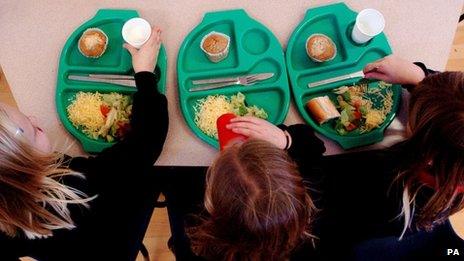Childcare sparks potent debate
- Published

Alex Salmond's critics suggested his backing for free school meals was driven by "external factors"
To govern is to choose. To govern is to adopt what Nye Bevan called, in a different context, "the language of priorities".
Today Alex Salmond chose to devote resources to free school meals for all children in primaries one to three. Labour suggested he had made the wrong choice.
It was a striking debate: redolent of underlying issues which will feature in the referendum but also in other electoral contests, including the Holyrood general election in 2016.
Mr Salmond's critics suggested that his enthusiasm for free school meals was driven by external factors: the availability of cash from the Treasury as a consequence of the previous announcement of a comparable scheme for England; a desire to cosset parents - and especially mothers - with an eye to the referendum.
The first minister insisted that he was persuaded by the advantages of the policy: it encouraged uptake including among those who were nominally eligible at present; it improved the health and wellbeing of youngsters and thus their educational attainment.
Labour's Johann Lamont said that free school meals were, all things being otherwise equal, a good thing.
However, she argued that they were, on balance, the wrong priority at a time of limited resources.
By definition, universal provision meant extending support beyond the poorest who were already helped. Instead, she said, any available cash should be spent on enhancing childcare.
This provoked barracking from the SNP benches, including the one at the front. Nicola Sturgeon looked particularly quizzical and challenging.
Those on the SNP side felt that Ms Lamont had ignored or sidestepped a further announcement in Mr Salmond's speech - to the effect that resources will also be devoted now to enhancing childcare for vulnerable two year olds.
Indeed, in winding up the debate, Education Secretary Mike Russell said that Ms Lamont had appeared incapable of changing her prepared speech in order to cope with the fact that the first minister's announcements straddled two factors: school meals and childcare.
Naturally, this is firmly rebutted by Labour who said that their leader and others who spoke against the Scottish government package were talking about relative priorities.
More, they said, could be done now to extend childcare.
For the avoidance of doubt, they also rejected a claim by Mr Russell that today's debate proved Labour were against free school meals.
It was, again, a question of relative priorities.
Why the quite remarkable political heat? Aside, of course, from the fact that the care and sustenance of Scotland's children really matters.
Because childcare has been placed at the core of the independence offer.
Alex Salmond argued again that a "transformation" in childcare was only feasible under independence because the compensatory tax take from parents thus enabled to work would remain in Scotland rather than going to the Treasury.
Labour said this claim reflected distorted priorities. They argued that the FM was only acting as he did in order to make childcare conditional upon independence.
Alex Salmond has been sensitive to that accusation. Hence his announcement today of enhanced provision now, under devolved power.
Hence the heckling from the SNP as Johann Lamont pursued her fundamental point.
A day of potent political debate in Parliament.